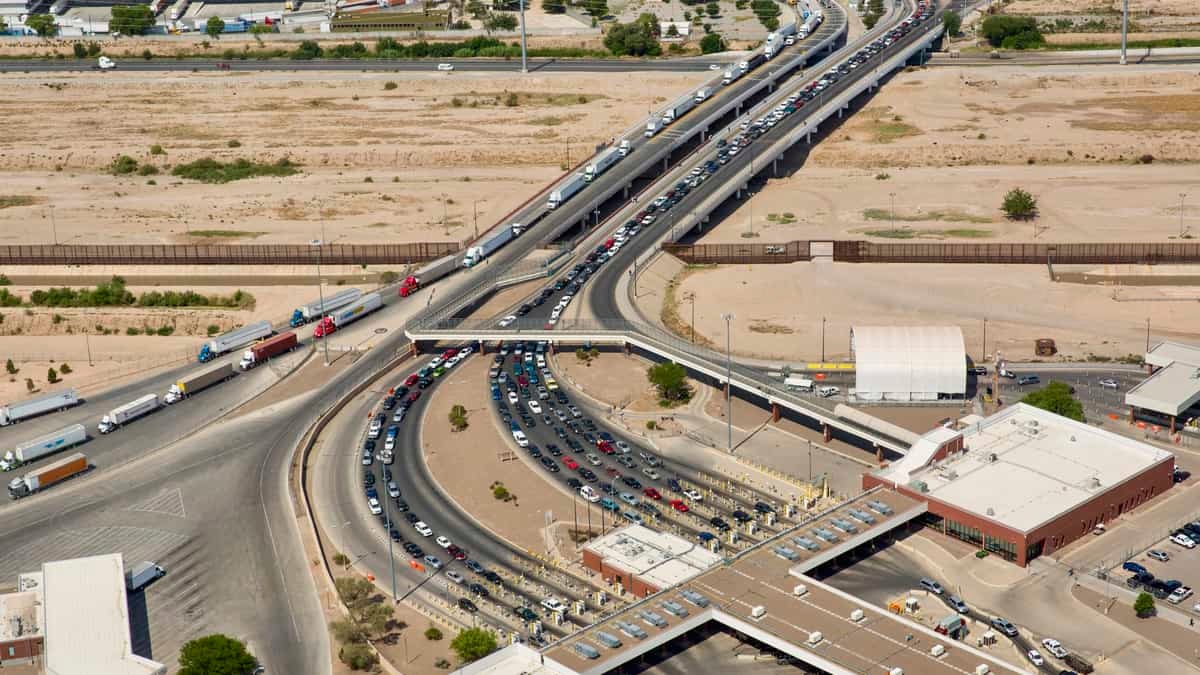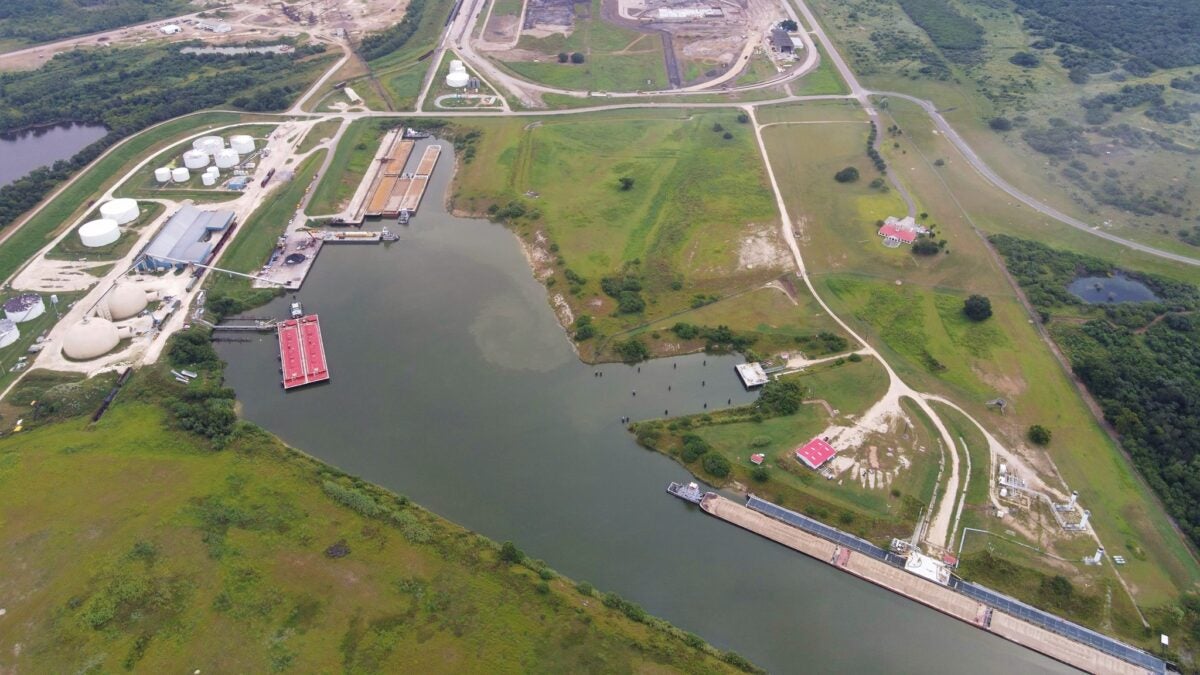Freight News:
Borderlands: Arizona border officials want Mexico trade lanes reopened
Borderlands is a weekly rundown of developments in the world of United States-Mexico cross-border trucking and trade. This week: Arizona border officials want Mexico trade lanes reopened; Study finds ending US-Mexico tomato pact could raise prices by 50%; Texas port receives $20M to fund rail infrastructure project; and Accurate Transport opens logistics hub in Houston.
Arizona border officials want Mexico trade lanes reopened
Cross-border operators in Arizona are calling on federal authorities to return customs personnel to their posts at the Nogales-Mariposa port of entry and reopen trade lanes that have been closed for over two weeks.
“These policies that the Department of Homeland Security [is] implementing are severely affecting the way our country should operate on the Southern border with legal trade and legal traffic that should be crossing every single day,” Joshua Rubin, vice president of business development at Javid LLC, told FreightWaves.
Javid is a Nogales, Mexico-based shelter company that helps manufacturers set-up operations in Mexico. Nogales, Arizona, and Nogales, Mexico, are sister cities along the border.
U.S. Customs and Border Protection (CBP) agents who would normally help process commercial cargo trucks are being shifted to immigration duties to handle the inflow of migrants at Mexico ports of entry.
The result has been a slowing of cargo processing of trucks arriving in Nogales from Mexico, Rubin said.
“What we are trying to express to [federal authorities] is that we’re getting into produce season and we’re getting into the holiday season; we’re getting into the time of year that makes our economic relationship with Mexico … the most lucrative opportunity that we have here in the border community,” Rubin said. “On Monday, I had 18 shipments that I couldn’t get across the border because of the reduction of CBP personnel. I have a broker friend that told me he had 25 shipments that he was not able to get across on Monday, and had to wait another day to cross.”
CBP officials said they have been working to “decompress” the migrant situation along the U.S.-Mexico border.
“We remain vigilant and expect to see fluctuations, knowing that smugglers continue to use misinformation to prey on vulnerable individuals,” a CBP spokesperson said in an email to FreightWaves. “CBP is executing our operational plans and working to decompress areas along the Southwest border. We are safely and efficiently vetting and processing migrants to place them in immigration enforcement proceedings consistent with our laws and operational planning efforts.”
CBP’s Tucson Field Office, which includes the Nogales-Mariposa port of entry, has been temporarily supporting the Tucson and Yuma Border Patrol sectors with processing migrants at various facilities, CBP officials said.
“The support will continue on an as needed basis and CBP will work to return to normal operations as quickly as feasible,” the CBP spokesperson said. “The Tucson Office of Field Operations will assist the Border Patrol in processing migrants who have arrived between the ports of entry. These efforts will focus primarily on vulnerable populations to include families and unaccompanied children. CBP regularly plans for and executes contingency measures, such as this, to support the overarching agency mission and ensure the safety and wellbeing of those in the agency’s custody.”
The Nogales-Mariposa port of entry has eight commercial vehicle inspection lanes and is the largest U.S. entry point for fresh produce from Mexico, representing about 45% of the fresh produce consumed in the U.S. during the winter months.
In 2022, the port of entry facilitated $21.6 billion in U.S.-Mexico trade, according to the University of Arizona.
The Nogales-Mariposa port of entry currently has two general cargo lanes and two Free and Secure Trade (FAST) program lanes open. As of Friday, cargo wait times for the general cargo lanes were over 40 minutes. It was 10 minutes for the FAST lanes.
Along with those from Nogales, CBP personnel at bridges in El Paso and Eagle Pass, Texas, have been reassigned to address the influx of migrants.
Cargo truck inspections at El Paso’s Bridge of the Americas and Bridge I in Eagle Pass have been suspended since Sept. 18.
The Bridge of the Americas is one of two commercial U.S.-Mexico border crossings in El Paso, the other being the nearby Ysleta-Zaragoza International Bridge. While Bridge I at the Eagle Pass port of entry is closed, the port’s Bridge II, also known as the Camino Real Bridge, remains open with one lane for cargo trucks.

In addition to delays caused by migrants, the ports in Eagle Pass and El Paso have had to contend with renewed state-run truck inspections by the Texas Department of Public Safety that began Sept. 20, further disrupting trade flows between Mexico and the U.S.
On Friday, cargo truck wait times at the Ysleta-Zaragoza bridge were over five hours and 20 minutes in the general commercial lanes and four and a half hours for vehicles permitted for the FAST program lanes.
The Camino Real Bridge in Eagle Pass had wait times of over three hours on Friday.
The Greater Nogales Santa Cruz County Port Authority, a group of private and public trade stakeholders in the region, recently sent a letter to Homeland Security Secretary Alejandro Mayorkas requesting that he reopen trade lanes and bring personnel back to Mexico ports of entry.
“We need to work with all our members of Congress to push and advocate that we need more Border Patrol, we need more CBP officers working at the ports to deal with issues that are going on,” said Rubin, vice chairman of the port authority. “The Department of Homeland Security … . why don’t we take CBP officers from the Canadian border, where less is going on, to process and assist the Border Patrol in Arizona, Texas? No, they would rather take away agents from the Southern ports, relocate those officers that are protecting the Southern border. Those are the other issues that we’re facing.”
Officials for the Department of Homeland Security did not immediately respond to a request for comment from FreightWaves.
Study finds ending US-Mexico tomato pact could raise prices by 50%
A new study from Arizona State University (ASU) said terminating the Tomato Suspension Agreement between the U.S. and Mexico could impact the economies of Arizona and Texas, while limiting options and raising prices for consumers.
The “Mexican Tomatoes: TSA-Tariff Analysis Report,” led by Timothy J. Richards, ASU chair of agribusiness, evaluated the impact that terminating the Tomato Suspension Agreement could have on consumer prices, retail sales and economic activity in Arizona and Texas, states central to the tomato supply chain in the U.S.
The study was undertaken after the Florida Tomato Exchange (FTE) trade group requested in June that the Department of Commerce end the 2019 Tomato Suspension Agreement with Mexico and place tariffs on imports of tomatoes from Mexico.
Tomatoes sold in the U.S. from Mexico are controlled by the U.S. Department of Commerce through the Tomato Suspension Agreement, which sets minimum pricing and regulates sales between growers and importers.
The FTE said Mexico-based growers continue to dump tomatoes into the U.S. — selling them for less than it costs to produce them — and alleges that the cheaper imports undercut the domestic market.
Key results of the ASU study include:
- Consumers could see tomato prices increase by an average of 52% if the agreement is terminated.
- Grocery retailers could see a $7.53 billion decrease in revenue as a result of termination of the agreement.
- In Arizona and Texas, economic activity could fall by $3.4 billion to $4.5 billion across sectors, with potential job losses of 22,000 to 32,000.
Lance Jungmeyer, president of the Nogales, Arizona-based Fresh Produce Association of the Americas, said terminating the agreement “will cause significant economic damage.”
“The Tomato Suspension Agreement ensures that American consumers, companies and communities have access to fresh, healthy, high-quality tomatoes at an affordable price,” Jungmeyer said in a statement.
A comment period is currently open at the Department of Commerce for the Tomato Suspension Agreement through Oct. 23. The Department of Commerce said it will make a decision based on the information provided.
The FTE did not immediately respond to a request for comment from FreightWaves.
Texas port receives $20M to fund rail infrastructure project
The Port of Victoria in southeast Texas announced it has received a grant to fund the first phase of a rail infrastructure project at its Texas Logistics Center (TXLC).
The $20.3 million grant is from the Texas Department of Transportation, in collaboration with Victoria County and the Victoria Sales Tax Development Corp.
TXLC is a business park the port is developing as a regional logistics hub with access to rail, water and highway transportation.
Phase 1 of the rail project at TXLC will begin in 2024 and is scheduled for completion in 2025. It will add over 42,000 feet of track, including the construction of three 10,000-foot drop-and-pull tracks.
Subsequent phases will include storage tracks, transloading operations and connections to new tenants. Upon completion, TXLC will be served by the Union Pacific and BNSF railroads.

The Port of Victoria is a shallow-draft inland facility about 117 miles from San Antonio and 125 miles from Houston. The port’s 35-mile Victoria Barge Canal offers shippers access to the Intracoastal Waterway, as well as rail and highway access to Houston, San Antonio and Austin.
Accurate Transport opens logistics hub in Houston
Transportation and logistics provider Accurate Transport recently opened a 33,000-square-foot terminal in Houston near George Bush Intercontinental Airport.
The facility supports the Carlstadt, New Jersey-based company’s expanding operations across the U.S. and rising demand for freight operations in the Eastern parts of the country, according to a news release.
“This investment reflects our deep commitment to the region and Texas market,” Chief Strategy Officer Jay Irons said in a statement.
Accurate Transport was founded in 1997 and has 78 trucks. The company provides services such as local hauls, less-than-truckload, last mile, warehousing/3PL, intermodal, distribution and fulfillment, and drayage.
Watch: What could be the impact of Russia’s ban on diesel exports?
Click for more FreightWaves articles by Noi Mahoney.
More articles by Noi Mahoney
Port Houston sees falling container traffic in August
Flexe conducts 2nd round of layoffs in 14 months
Former Texas border agent pleads guilty to hiring undocumented truck drivers
The post Borderlands: Arizona border officials want Mexico trade lanes reopened appeared first on FreightWaves.
Source: freightwaves - Borderlands: Arizona border officials want Mexico trade lanes reopened
Editor: Noi Mahoney